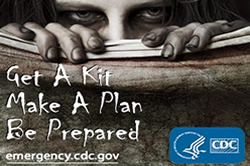June 9th, 2011 by Bryan Vartabedian, M.D. in Opinion
No Comments »

 This NCI Cancer Bulletin article on the use of social media at this week’s American Society of Clinical Oncology is worth reading. It showcases how a major medical organization sees social media unfolding at a national meeting. I’ll be following #ASCO11 closely where some sources predict the Tweet count could reach 10-15,000.
This NCI Cancer Bulletin article on the use of social media at this week’s American Society of Clinical Oncology is worth reading. It showcases how a major medical organization sees social media unfolding at a national meeting. I’ll be following #ASCO11 closely where some sources predict the Tweet count could reach 10-15,000.
What caught my eye was discussion surrounding the speaker-imposed restriction of Twitter at scientific presentations. Apparently some meetings such as the Biology of Genomes Conference at Cold Spring Harbor Laboratory, presenters have to grant permission to allow the use of Twitter (this apparently will not be the case at ASCO).
This is a quote from the meeting media policy at Cold Spring Harbor Laboratory
Often, during the course of a meeting, a scientist will present a discovery, method, or current project that is not yet complete or published. Therefore, to prevent the premature release of confidential information, we require all media attendees to obtain permission in advance from the relevant scientist prior to reporting any spoken or printed information gleaned from the meetings. Media attendees are encouraged to approach scientists out-of-session (e.g. during coffee breaks, poster sessions, wine and cheese parties, etc.) for informal discussions, formal interviews, and/or permission to report sensitive information at the appropriate time. Read more »
*This blog post was originally published at 33 Charts*
June 7th, 2011 by Bryan Vartabedian, M.D. in Medblogger Shout Outs
No Comments »

I love finding new physician voices. Here are a few that I’ve been peeking at over the past couple months. They’re worth checking out.
Linda Pourmassina. Linda is an internist in Seattle and one of the finest writers in the medical blogosphere. You can find her over at Pulsus where she offers commentary on an eclectic mix of medical goodness ranging from social media to the subtleties of patient interaction. Really good stuff. Check out The Internet and Delusional Thinking. Beyond her blog, Linda’s Twitter output is the perfect balance of valuable links and dialog. Put her in your feed and she’ll bring you good things.
Chris Porter. Chris is a surgeon who has been writing at On Surgery, Etc. since April. This guy has an incredible voice and offers rare insight into the experience of the surgeon. He has a remarkable way of seeing medicine at its most granular level. When he corrals his narrative in just the right way I expect we may see him on the new release table at Barnes & Noble. Check out his experience as a surgeon in Guatemala. And from the narrow column Blogger template to the liberal use of crazy images, his site offers the raw feel of some of the vintage medical bloggers. His bio reflects the mindset of a next-gen physician: I’m Phoenix-based and world oriented. How can you resist that? Read more »
*This blog post was originally published at 33 Charts*
May 26th, 2011 by Bryan Vartabedian, M.D. in Health Policy, Humor
No Comments »

 This is good. I knew the CDC was socially tuned-in but this came as a surprise: Preparedness 101: Zombie Apocalypse . It’s every American’s guide to dealing with a zombie attack. You come thinking zombies but take away principles for emergency preparedness. Well done, CDC.
This is good. I knew the CDC was socially tuned-in but this came as a surprise: Preparedness 101: Zombie Apocalypse . It’s every American’s guide to dealing with a zombie attack. You come thinking zombies but take away principles for emergency preparedness. Well done, CDC.
The real take away for those of us looking under the hood: effective health messaging should be creative and fun. While we’ll never be able to measure the true effectiveness of this approach in an emergency, expect the post’s massive traffic to convert important links on emergency preparedness. Hopefully the CDC will release stats on the effectiveness of this campaign.
I’d like to write more, but I’m goin’ to make my kit.
*This blog post was originally published at 33 Charts*
May 22nd, 2011 by Bryan Vartabedian, M.D. in Opinion
No Comments »

This Techcrunch post, The Illusion of Social Networks, is worth thinking about. The author Semil Shah suggests that we have a tendency to use social networks to create illusions for our audiences. And over time these illusions compound to create something that may not reflect real life. It’s a type of socical psychomanipulation.
But I wonder if Shah overstates the shady side of human social conduct. I’m more optimistic about the promise of human connectedness. The crowd is smarter than we think. And while we can create any story possible, it’s ultimately the responsibility of the listening masses to decide what’s real. It’s our job to ask the hard questions. Be it television, the web, or our own homes, we’re individually responsible for who we let into our world. Read more »
*This blog post was originally published at 33 Charts*
May 17th, 2011 by Bryan Vartabedian, M.D. in Health Tips, Opinion
No Comments »

I’ve been to several major medical meetings recently and Twitter is beginning to see traction. Slowly but surely Twitter hashtag use among doctors at meetings is growing. The vendors are there, too. I attended AGA/Digestive Disease Week this week and I have been unimpressed with the attempts of vendors to participate in the back channel. Those trying seem inept at real dialog.
Remember that a meeting’s Twitter feed is a communication channel, not an opportunity for spam. Go ahead and remind us about your booth but only after contributing in a way that serves everyone in a non-promotional way (one pitch tweet for 10-20 informational tweets).
What works is sharing, not selling. Take interest in the attendees. Watch the feed. Listen. Re-tweet the interesting stuff. Share some breaking medical information. Reach out to attendees in a genuine, respectful way. And fear is no excuse – because the most memorable dialog will not involve your drug or medical device.
Start there and Twitter will work for not only for you but everyone.
*This blog post was originally published at 33 Charts*
 This NCI Cancer Bulletin article on the use of social media at this week’s American Society of Clinical Oncology is worth reading. It showcases how a major medical organization sees social media unfolding at a national meeting. I’ll be following #ASCO11 closely where some sources predict the Tweet count could reach 10-15,000.
This NCI Cancer Bulletin article on the use of social media at this week’s American Society of Clinical Oncology is worth reading. It showcases how a major medical organization sees social media unfolding at a national meeting. I’ll be following #ASCO11 closely where some sources predict the Tweet count could reach 10-15,000.













